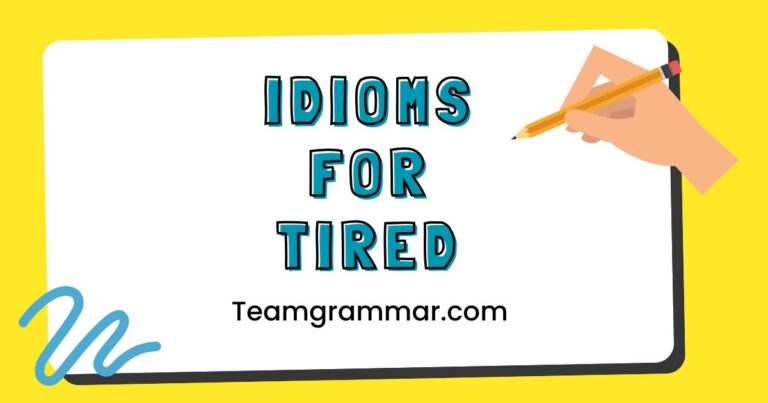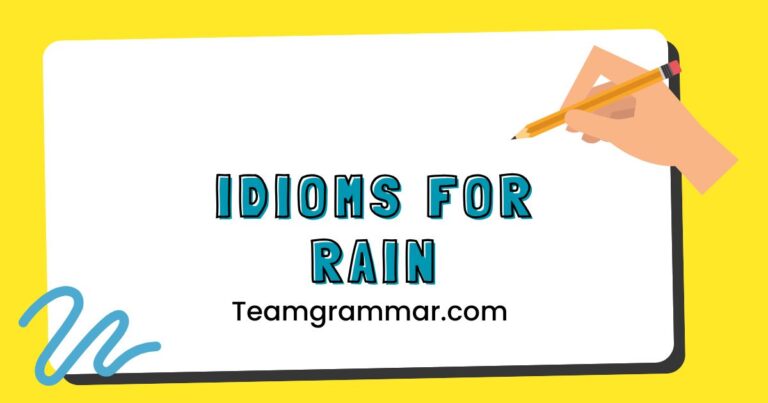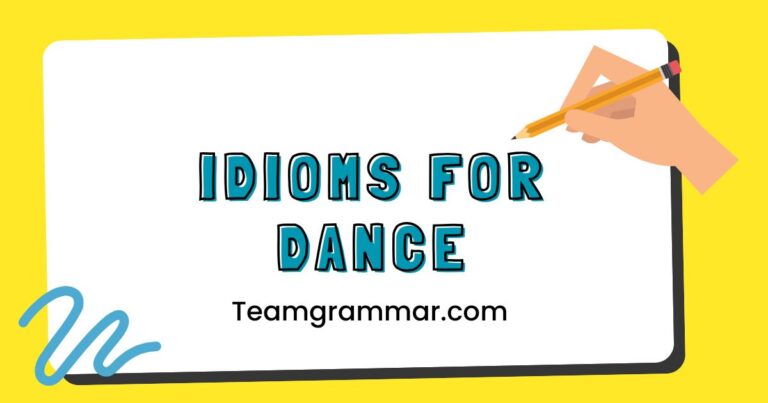41 Age-Old Wisdom: Mastering Idioms About Age in English
Idioms are an integral part of the English language, adding color and depth to our conversations. Understanding idioms, particularly those related to age, enhances comprehension and fluency.
These expressions often reflect cultural attitudes towards different life stages. This article provides a comprehensive guide to idioms about age, designed for English language learners of all levels.
Whether you’re a beginner or an advanced speaker, this resource will help you master these common and colorful phrases, enabling you to communicate more effectively and naturally.
Table of Contents
- Introduction
- Definition of Idioms About Age
- Structural Breakdown
- Categories of Idioms About Age
- Examples of Idioms About Age
- Usage Rules
- Common Mistakes
- Practice Exercises
- Advanced Topics
- FAQ
- Conclusion
Introduction
Idioms are phrases or expressions whose meanings cannot be understood from the ordinary meanings of the words within them. They are a crucial part of mastering any language, and English is no exception.
Idioms related to age are particularly interesting as they often reflect cultural perceptions and stereotypes about different stages of life. Understanding these idioms not only enriches your vocabulary but also provides insights into the cultural nuances of the English-speaking world.
This article aims to provide a comprehensive guide to idioms about age, helping you to understand, recognize, and use them effectively in your daily communication.
Definition of Idioms About Age
Idioms about ageare fixed expressions or phrases that convey a figurative meaning related to a specific stage of life, such as youth, middle age, or old age. These idioms are often metaphorical and cannot be interpreted literally.
Their meaning is derived from cultural context and common usage. For example, “to be in one’s prime” does not literally refer to a mathematical prime number but signifies being at the peak of one’s abilities and health, typically associated with middle age.
The function of these idioms is to add color, emphasis, and a deeper layer of meaning to communication. They allow speakers to express complex ideas or feelings in a concise and memorable way.
Additionally, using idioms correctly demonstrates a strong command of the English language and an understanding of its cultural subtleties.
Structural Breakdown
Idioms, by their nature, do not adhere to standard grammatical rules in terms of literal interpretation. They function as single units of meaning.
The structural elements of idioms about age can vary widely. Some are simple phrases, while others are more complex clauses or sentences.
The key is that the entire expression, rather than the individual words, carries the intended meaning.
For example, the idiom “over the hill” consists of a preposition (“over”), an article (“the”), and a noun (“hill”). Taken literally, this phrase describes a physical location.
However, idiomatically, it means past one’s prime, typically referring to someone who is getting old. The structure is straightforward, but the meaning is figurative.
Another example is “young at heart.” This idiom consists of an adjective (“young”), a preposition (“at”), and a noun (“heart”). The structure appears simple, but the meaning is that someone maintains a youthful spirit and attitude, regardless of their actual age.
Categories of Idioms About Age
Idioms about age can be categorized based on the stage of life they refer to:
Idioms About Youth
These idioms describe the characteristics, experiences, and perspectives associated with being young. They often emphasize innocence, energy, and potential.
Idioms About Middle Age
These idioms reflect the experiences and perceptions of middle age, often focusing on career, family, and health. They can also express a sense of reflection or nostalgia.
Idioms About Old Age
These idioms describe the characteristics and challenges of old age, often focusing on wisdom, experience, and physical limitations. They can sometimes carry negative connotations, so it’s important to use them carefully.
Examples of Idioms About Age
Here are some examples of idioms about age, categorized by life stage:
Youth Examples
The following table provides examples of idioms related to youth, along with their meanings and example sentences.
| Idiom | Meaning | Example Sentence |
|---|---|---|
| Wet behind the ears | Inexperienced and naive | He’s a bit wet behind the ears, so he needs guidance. |
| Greenhorn | A novice or beginner | She’s still a greenhorn in the industry, but she’s learning fast. |
| Young blood | New, energetic people in an organization | The company needs some young blood to revitalize its strategies. |
| In one’s salad days | A time of youthful inexperience and exuberance | During his salad days, he traveled the world without a care. |
| Knee-high to a grasshopper | Very young or small | I’ve known him since he was knee-high to a grasshopper. |
| Still cutting one’s teeth | Still in the early stages of learning or gaining experience | He’s still cutting his teeth in the business world. |
| A babe in the woods | An innocent and naive person | She’s a babe in the woods when it comes to politics. |
| Not dry behind the ears | Lacking experience | He’s not dry behind the ears yet, so be patient with him. |
| In the spring of one’s life | During one’s youth | She met her husband in the spring of her life. |
| At a tender age | Very young | He started playing the piano at a tender age. |
| A child prodigy | A young person with exceptional talent | Mozart was a child prodigy, composing music at a very early age. |
| Full of beans | Lively and energetic (often used for children) | The kids were full of beans after their nap. |
| Just a kid | A young person, often used to imply innocence or lack of responsibility | He’s just a kid; you can’t expect him to understand everything. |
| A fresh face | A new and inexperienced person | The company hired a fresh face to bring in new ideas. |
| In the bloom of youth | In the prime of one’s young age | She was in the bloom of youth when she won the beauty pageant. |
| Young and foolish | Acting rashly or unwisely due to inexperience | We were young and foolish and made a lot of mistakes. |
| Young at heart | Having a youthful spirit despite one’s age | My grandmother is 80, but she’s still young at heart. |
| Have one’s whole life ahead of one | To have many opportunities and experiences to come | She’s only 20; she has her whole life ahead of her. |
| A whippersnapper | A young and energetic person, sometimes used dismissively | That whippersnapper thinks he knows everything. |
| Young hopeful | A young person with a promising future | He’s a young hopeful in the world of tennis. |
| In one’s infancy | In the early stages of development or existence | The project is still in its infancy, but it shows great promise. |
| At a young age | Early in life | He showed musical talent at a young age. |
| A spring chicken | A young person (often used humorously to deny being old) | I may not be a spring chicken anymore, but I can still run a mile. |
Middle Age Examples
The following table provides examples of idioms related to middle age, along with their meanings and example sentences.
| Idiom | Meaning | Example Sentence |
|---|---|---|
| Over the hill | Past one’s prime | Some people think 40 is over the hill, but I disagree. |
| In one’s prime | At the peak of one’s abilities | He was in his prime when he won the championship. |
| Middle-aged spread | Weight gain associated with middle age | He started to notice the middle-aged spread after turning 45. |
| Getting on | Getting older | She’s getting on a bit, but she’s still very active. |
| No spring chicken | Not young anymore | I’m no spring chicken, but I can still keep up with the youngsters. |
| In the autumn of one’s years | Approaching old age | He’s in the autumn of his years and enjoying retirement. |
| Seasoned veteran | Experienced and knowledgeable | She’s a seasoned veteran in the field of medicine. |
| Life begins at forty | The idea that life can be fulfilling after the age of forty | They say life begins at forty, and I’m starting to believe it. |
| The wrong side of forty | Older than forty | He’s on the wrong side of forty, but he still feels young. |
| Old enough to know better | Experienced enough to make good decisions | He’s old enough to know better than to drive that fast. |
| Midlife crisis | A period of emotional turmoil in middle age caused by a need to redefine one’s identity | He bought a sports car as part of his midlife crisis. |
| Past one’s sell-by date | Too old to be effective or attractive | Some people think politicians are past their sell-by date after a certain age. |
| At the height of one’s career | At the peak of one’s professional success | She was at the height of her career when she decided to retire. |
| Old head on young shoulders | A young person who thinks and acts like an older person | He’s an old head on young shoulders, always giving wise advice. |
| Starting to show one’s age | Beginning to look or feel older | He’s starting to show his age, with more wrinkles and gray hair. |
| Middle of the road | Moderate or conventional, often used to describe political views or lifestyle | He has middle of the road political views. |
| Coming of age | The transition from childhood to adulthood | This novel is a coming of age story about a young girl’s journey. |
| Established professional | A person who has achieved a stable and respected position in their career | She is an established professional in her field. |
| Settling down | Starting a family and living a more stable life | They decided to settle down and buy a house in the suburbs. |
Old Age Examples
The following table provides examples of idioms related to old age, along with their meanings and example sentences.
| Idiom | Meaning | Example Sentence |
|---|---|---|
| Long in the tooth | Old or aging | He’s getting a bit long in the tooth to be playing professional sports. |
| Over the hill and far away | Past one’s prime and no longer relevant | Some people thought he was over the hill and far away, but he surprised everyone with his comeback. |
| As old as the hills | Very old | That joke is as old as the hills. |
| In one’s twilight years | In the final years of one’s life | She spent her twilight years surrounded by family. |
| Golden years | The retirement years | They are enjoying their golden years traveling the world. |
| Old-timer | An elderly person | The old-timer had many stories to tell about the town’s history. |
| Getting on in years | Growing older | He’s getting on in years, but he’s still sharp as a tack. |
| In the autumn of one’s life | Approaching old age | He’s in the autumn of his life and enjoying retirement. |
| A senior citizen | An elderly person, often used in official contexts | Senior citizens are eligible for discounts at the museum. |
| Old hat | Outdated or no longer interesting | That technology is old hat; there are much better options available now. |
| Old as Methuselah | Extremely old | That car is old as Methuselah; I’m surprised it still runs. |
| Past one’s prime | No longer at one’s best | He’s past his prime as an athlete. |
| Set in one’s ways | Unwilling to change one’s habits or opinions | My grandfather is very set in his ways. |
| The wrong side of seventy | Older than seventy | She’s on the wrong side of seventy, but still very active. |
| One foot in the grave | Very close to death | He’s got one foot in the grave, but he’s still fighting. |
| A relic of the past | Something or someone from a bygone era | That typewriter is a relic of the past. |
| In one’s dotage | In a state of senility in old age | He’s in his dotage and doesn’t remember much anymore. |
| A golden ager | An elderly person enjoying their retirement years | The community center offers many activities for golden agers. |
| Old-fashioned | Outdated or no longer in style | That dress is a bit old-fashioned. |
Usage Rules
When using idioms about age, it’s important to consider the context and audience. Some idioms may be considered offensive or insensitive, especially those related to old age.
It’s also crucial to use idioms correctly to avoid miscommunication.
Rule 1: Understand the meaning: Before using an idiom, ensure you fully understand its meaning and connotations. Misusing an idiom can lead to confusion or embarrassment.
Rule 2: Consider the audience: Be mindful of your audience and avoid using idioms that may be offensive or insensitive, particularly when discussing age.
Rule 3: Context is key: Use idioms in appropriate contexts. Some idioms are informal and should be avoided in formal settings.
Rule 4: Grammatical correctness: Ensure that the idiom fits grammatically within the sentence. While idioms are fixed expressions, they still need to be integrated correctly into the sentence structure.
Rule 5: Avoid overusing idioms: While idioms can add color to your language, overusing them can make your speech sound unnatural or contrived.
Common Mistakes
One common mistake is to interpret idioms literally. For example, someone might misunderstand “over the hill” to mean physically located above a hill, rather than past one’s prime.
Another common mistake is to misuse idioms by changing their wording. Idioms are fixed expressions, and altering them can change their meaning or make them nonsensical.
Here are some examples of common mistakes and their corrections:
| Incorrect | Correct | Explanation |
|---|---|---|
| He is in his salad days now. | He was in his salad days. | “Salad days” refers to a past period of youth and inexperience. |
| She is getting on her years. | She is getting on in years. | The correct idiom is “getting on in years.” |
| He’s a long tooth. | He’s long in the tooth. | The idiom is “long in the tooth,” not “a long tooth.” |
| Over the hill and far away to work. | He’s over the hill. | The idiom “over the hill and far away” is often shortened to “over the hill” and does not refer to a physical location. |
Practice Exercises
Test your understanding of idioms about age with these exercises:
Exercise 1: Choose the correct idiom to complete each sentence.
| Question | Options | Answer |
|---|---|---|
| He’s still __________, so he needs guidance. | a) over the hill b) wet behind the ears c) in his prime | b) wet behind the ears |
| She’s __________, but she’s still very active. | a) getting on b) over the hill c) in her prime | a) getting on |
| That joke is __________. | a) as young as the hills b) as old as the hills c) over the hill | b) as old as the hills |
| He bought a sports car as part of his __________. | a) golden years b) midlife crisis c) salad days | b) midlife crisis |
| They are enjoying their __________ traveling the world. | a) twilight years b) golden years c) salad days | b) golden years |
| She’s a __________ in the field of medicine. | a) seasoned veteran b) young blood c) greenhorn | a) seasoned veteran |
| They say __________ , and I’m starting to believe it. | a) life begins at forty b) life ends at forty c) life is over at forty | a) life begins at forty |
| He’s __________ to be playing professional sports. | a) long in the tooth b) short in the tooth c) wide in the tooth | a) long in the tooth |
| The company needs some __________ to revitalize its strategies. | a) old blood b) young blood c) middle blood | b) young blood |
| She spent her __________ surrounded by family. | a) salad years b) bloom years c) twilight years | c) twilight years |
Exercise 2: Match the idiom with its meaning.
- Over the hill
- In one’s prime
- Young at heart
- Long in the tooth
- Golden years
- Past one’s best
- At the peak of one’s abilities
- Having a youthful spirit despite age
- Old or aging
- Retirement years
Answers:
- 1-A
- 2-B
- 3-C
- 4-D
- 5-E
Advanced Topics
For advanced learners, it’s beneficial to explore the etymology and historical context of idioms about age. Understanding the origins of these expressions can provide deeper insights into their meanings and cultural significance.
Additionally, analyzing how idioms about age are used in literature, film, and other forms of media can further enhance comprehension and appreciation of the English language. This involves studying how idioms are adapted or subverted for creative effect.
Another advanced topic is the comparison of idioms about age across different cultures. While some idioms may have direct equivalents in other languages, others may be unique to English or have different connotations in other cultures.
This comparative analysis can promote cross-cultural understanding and communication.
Finally, exploring the evolution of these idioms over time can be insightful. Language is constantly changing, and some idioms may become obsolete while new ones emerge.
Studying these changes can provide a fascinating glimpse into the dynamic nature of language and culture.
FAQ
Q1: What is an idiom?
An idiom is a phrase or expression whose meaning cannot be understood from the ordinary meanings of the words within it. It’s a fixed expression with a figurative meaning.
Q2: Why is it important to learn idioms?
Learning idioms enhances your understanding of the English language and culture. It also allows you to communicate more effectively and naturally.
Q3: Are idioms about age always negative?
No, not all idioms about age are negative. Some, like “in one’s prime” or “golden years,” have positive connotations.
However, it’s important to be mindful of the potential for offense when using idioms about old age.
Q4: Can I change the wording of an idiom?
No, idioms are fixed expressions and should not be altered. Changing the wording can change the meaning or make the idiom nonsensical.
Q5: How can I learn more idioms?
Read books, watch movies, and listen to native English speakers. Pay attention to how idioms are used in context and try to incorporate them into your own conversations.
Q6: What is the difference between an idiom and a proverb?
An idiom is a phrase with a figurative meaning, while a proverb is a short, wise saying that offers advice or a general truth. For example, “actions speak louder than words” is a proverb, while “break a leg” is an idiom.
Q7: How do I know when to use an idiom?
Consider the context, audience, and your comfort level. Use idioms when they fit naturally into the conversation and when you are confident that your audience will understand them.
Q8: Are there idioms about age that are specific to certain regions or dialects?
Yes, some idioms about age may be specific to certain regions or dialects of English. For example, an idiom used in British English may not be common in American English, and vice versa.
Q9: Is it ever appropriate to use age-related idioms in a formal setting?
It depends on the specific idiom and the level of formality. Generally, it’s best to avoid informal or potentially offensive idioms in formal settings.
Opt for more neutral or professional language.
Q10: How can I avoid misusing idioms about age?
Always double-check the meaning and usage of an idiom before using it. Pay attention to how native speakers use the idiom in context and practice using it yourself.
Conclusion
Mastering idioms about age is a valuable step in achieving fluency and cultural competence in English. By understanding the meanings, usage rules, and potential pitfalls of these expressions, learners can communicate more effectively and confidently.
This article has provided a comprehensive overview of idioms about age, covering their definition, structure, categories, examples, and common mistakes. Remember to practice using these idioms in context and to be mindful of your audience and the potential for misinterpretation.
As you continue your language learning journey, remember that idioms are just one piece of the puzzle. By continuously expanding your vocabulary, grammar skills, and cultural knowledge, you can unlock new levels of fluency and understanding.
Keep practicing, keep exploring, and keep enjoying the richness and diversity of the English language.







